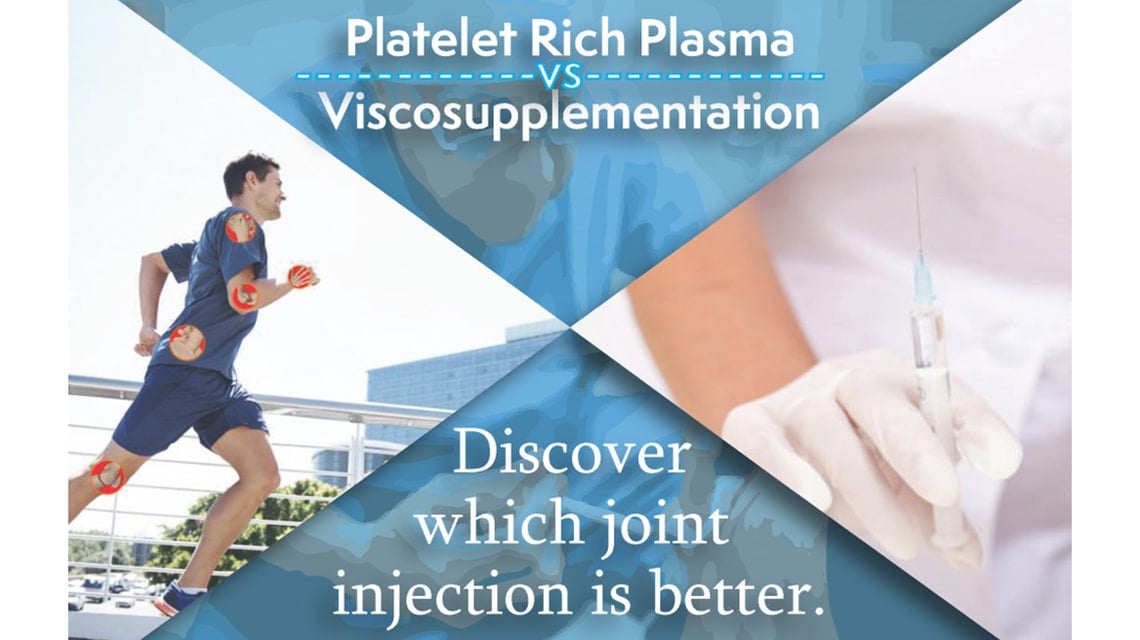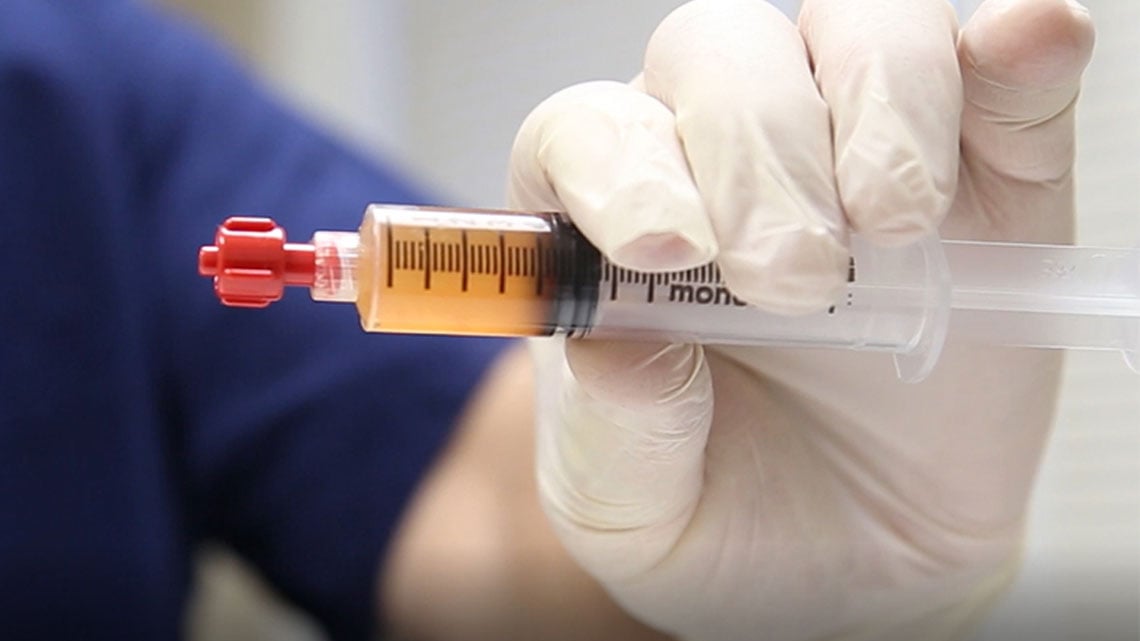PRP Injection vs. Viscosupplementation

Which injection is right for your joints?
George Chang-Chien, D.O., Aaron Calodney, M.D.
Hyaluronic acid (HA) injection, often referred to as viscosupplementation, is FDA approved for arthritis of the knee. Due to its success, some physicians have been using it “off-label” (not FDA approved) for the treatment of arthritis in the hip, shoulder, and sacroiliac joints. Once injected the gel-like fluid mimics the synovial fluid that surrounds the joint. This fluid acts as both a lubricant and a shock absorber allowing the bones to move more smoothly against each other.
In time it is absorbed into the joint surface where it can stimulate chondrocyte metabolism (the cells that make up cartilage) resulting in a more durable cartilage. A systematic review of 76 randomized controlled trials concluded that injectable hyaluronic acid is an effective treatment for knee osteoarthritis, resulting in beneficial effects on pain, function and patient global assessment.[1]
Platelet rich plasma (PRP) is plasma with many more platelets than what is typically found in blood. The platelets contain growth factors such as platelet-derived growth factor, epidermal growth factor (EGF), fibroblast growth factor, and connective tissue growth factor. Targeted delivery of these growth factors to injured tissues can accelerate and promote the healing cascade within your body. A high-quality PRP system can concentrate platelets 6-10 times greater than what is usual in blood.
The injection of PRP is not regulated by the US Food and Drug Administration (FDA). Even so, devices used to separate whole blood into PRP do require FDA approval through the 510(k) process. Multiple level 1 studies exist demonstrating efficacy of PRP in the treatment of tendon injuries, and osteoarthritis resulting in increased function, and reduction in pain. Current studies investigating the use of PRP include hair regrowth, dermatologic rejuvenation, and cardiac muscle repair.
How do you decide between injection of hyaluronic acid or platelet rich plasma?
-
- PRP has been demonstrated to be non-inferior (equal) and even superior to HA in multiple studies.
- HA is FDA approved only for use in the knee, and thus typically not covered by insurance when used in any other joint.
- The theoretical risk of infection, or auto-immune reaction is lower with PRP as it comes from your own body, and contains leukocytes (white blood cells that fight infection).
- Patients can save money buy choosing these injections. If you chose to use HA in your patient for a non-FDA approved indication to treat shoulder or hip osteoarthritis, the patient will cost them approximately $1500-1800 for the medication. Then, they will pay you for the injection, incurring office visit and procedural costs.
- Although the cost for PRP varies, PRP injection into a large joint often will range between $800-1200.
In conclusion, platelet rich plasma has been demonstrated by multiple high level studies to be as effective or superior to hyaluronic acid injections for knee arthritis. It does not pose a risk for reactive synovitis. The risk of infection or auto-immune reaction should be much lower, and there is significant cost savings when compared to hyaluronic acid injections.
Sample of studies demonstrating the superiority of platelet rich plasma to hyaluronic injections:
Kanchanatawan W, Arirachakaran A, Chaijenkij K, Prasathaporn N, Boonard M5, Piyapittayanun P, Kongtharvonskul J. Short-term outcomes of platelet-rich plasma injection for treatment of osteoarthritis of the knee. Knee Surg Sports Traumatol Arthrosc. 2015 Sep 19.
Raeissadat SA, Rayegani SM, Hassanabadi H, Fathi M, Ghorbani E, Babaee M, Azma K. Knee Osteoarthritis Injection Choices: Platelet- Rich Plasma (PRP) Versus Hyaluronic Acid (A one-year randomized clinical trial). Clin Med Insights Arthritis Musculoskelet Disord. 2015 Jan 7;8:1-8.
Kon E, Mandelbaum B, Buda R, Filardo G, Delcogliano M, Timoncini A, Fornasari PM, Giannini S, Marcacci M. Arthroscopy. Platelet-rich plasma intra-articular injection versus hyaluronic acid viscosupplementation as treatments for cartilage pathology: from early degeneration to osteoarthritis. 2011 Nov;27(11):1490-501.
Chang KV, Hung CY, Aliwarga F, Wang TG, Han DS, Chen WS. Comparative effectiveness of platelet-rich plasma injections for treating knee joint cartilage degenerative pathology: a systematic review and meta-analysis. Arch Phys Med Rehabil. 2014 Mar;95(3):562-75
[1] Bellamy N, Campbell J, Robinson V, Gee T, Bourne R, Wells G. Viscosupplementation for the treatment of osteoarthritis of the knee. Cochrane Database Syst Rev. 2006 Apr 19;(2):CD005321
-3.jpg?width=693&height=225&name=Apex%20Logo%20(NEW%20-w-o%20gradient)-3.jpg)

